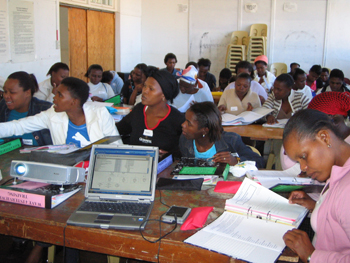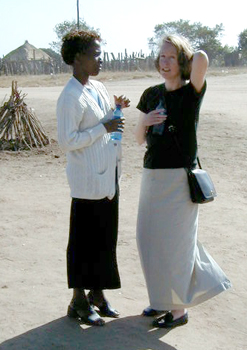Anne Case: Raising Awareness about the Devastating Impact of AIDS in Africa
April 29, 2009
 |
Field workers train to collect data for the Cape Area Panel Study, a longitudinal study on the economic and physical health of household members in metropolitan Cape Town. The study is run jointly by the University of Cape Town, the University of Michigan, and Princeton. |
Among the densely populated township of shacks outside of Cape Town, South Africa, the pandemic of AIDS has reached its zenith. Twenty-two million people are estimated to be living with HIV and AIDS in Africa, with almost two million new infections every year. UNAIDS estimates approximately 1.5 million people die of AIDS every year in Africa.
Distinguished economist and University at Albany alumna Anne C. Case has been conducting research in the township, known as Khayelitsha, as well as in a rural area in Northeastern South Africa in Mpumalanga Province, in a field site known as Agincourt.
“Sub-Saharan Africa is more affected by the AIDS epidemic than any other part of the world,” said Case, a University at Albany alumna and professor at Princeton University. “In addition to the devastating effects on those who fall ill, there is a great deal of collateral damage. The change in the age-mortality profile (from death in infancy or old age to death in middle age) brings with it profound effects on household finances. In addition, treatment of HIV and AIDS affects the health care available for non-AIDS related health services.”
On Friday, May 1, Case returns to her alma mater with her husband and colleague Angus S. Deaton, to give a talk on the damage caused by AIDS in Africa at 10:30 a.m. in the D'Ambra Auditorium of the Life Sciences Research Building.
Case, who has done influential work on voting, economic policy, and international health, will receive a Distinguished Alumni award that evening from the Alumni Association at the Crowne Plaza at 6 p.m. She graduated first in the Class of 1980, and went on to earn a master's in public affairs and a doctorate in economics from Princeton University in 1988.
"I'm looking forward to being back on campus," said Case. "This visit is very special for me."
Case began her career as an assistant professor at Harvard. She is currently the Alexander Stewart 1886 Professor of Economics and Public Affairs in the Department of Economics and Woodrow Wilson School at Princeton. She also directs the Research Program in Development Studies.
"In the areas of health and development economics, she is truly a leader, among the best-known researchers in the world," said Kaushik Basu, chair of Cornell University's Department of Economics.
 |
Case (at right) confers with a woman during training for data collection at the Agincourt field site in Mpumalanga Province in Northeastern South Africa. Some households had experienced the death of a household member in the last 18 months, and were experiencing a lasting impact from funeral expenses. |
Michael Jerison, professor and chair of the UAlbany Department of Economics, said, "Anne Case combines sophisticated statistical methods with a deep understanding of the data, much of it collected in field studies she directs. Her research contributes to major economic policy debates. For example, she has recently shown that an important way income inequality is transmitted from one generation to the next in the U.S. is through children's chronic health problems."
Distinguished Professor of Economics Kajal Lahiri taught Case her first course in econometrics -- statistics applied to economic analysis -- and nominated her for the Alumni award. "It is a pleasure to see such an outstanding student succeed so brilliantly," said Lahiri.
Angus Deaton is president of the American Economic Association, the largest scholarly society of economists. He is a pioneer in the analysis of consumer behavior, income and wealth inequality, and health in economic development, and is often mentioned as a candidate for the Nobel Prize. He will speak at 11:30 a.m. on Instruments of Development: Randomization in the Tropics and the Search for Elusive Keys to Economic Development.
The two economists have collaborated in the past, co-authoring "Health and Wealth Among the Poor: India and South Africa Compared," American Economic Review Papers and Proceedings, 2005.
The lectures are part of a series of talks by leading econometricians. The first speaker in the series was Robert Engle, 2003 Nobel Laureate in Economics.
![]() For more news, subscribe to UAlbany's RSS headline feeds
For more news, subscribe to UAlbany's RSS headline feeds


